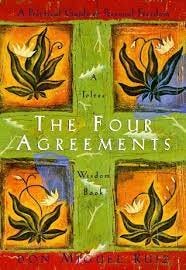What genre? personal growth, self-leadership, interpersonal relationships
Why read? describes a few simple principles, inspired by Toltec wisdom, to lead a more balanced, peaceful life
3 concepts that inspired me:
Re-think personal beliefs that may cause you suffering. There are hundreds of “agreements” we’ve made with ourselves, which we would benefit from re-questioning i.e., “This is what I am. This is what I believe. This is what I can do. This is what I cannot do”. Some of these beliefs come from our fears and they are the foundation of our pain and our suffering. To live a more fulfilled life, we could identify then try to let go of the agreements which do not serve us.
Don’t take anything personally. What people say and how people behave around you are a reflection of who they are, what they’re going through, of their own worries, insecurities, fears, wounds etc. Even when a situation seems so personal, even if someone says hurtful things to you directly, it doesn’t have much to do with you, it has a lot to do with them. In not taking anything personally, one can grow in empathy but also preserve so much energy they otherwise would waste on being upset or hurt with others’ words and actions - often unrelated to them.
Always do your best. And your best will vary. Sometimes you’re in a great place and your best will feel top notch to you. Other times you’re tired, sick, or sad - and your best will not feel great to you. That’s okay - as long as you try your best, no more and no less, one should feel good. If you do more than you feel you can give, you deplete your body from precious energy, which will hurt you in the long run. If you do less than you feel you can give, you will experience frustrations or self-judgement. Always just do the best you have access to.
2 excerpts I enjoyed reading:
On self-forgiveness:
“How many times do we pay for one mistake? The answer is thousands of times. The human is the only animal on earth that pays a thousand times for the same mistake. The rest of the animals pay once for every mistake they make. But not us. We have a powerful memory. We make a mistake, we judge ourselves, we find ourselves guilty, and we punish ourselves. If justice exists, then that was enough, we don’t need to do it again. But every time we remember, we judge ourselves again, we are guilty again, and we punish ourselves again, and again, and again. If we have a wife or a husband, he or she also reminds us of the mistake, so we can judge ourselves again, punish ourselves again, and find ourselves guilty again. Is this fair?”
On making assumptions:
“It is very interesting how the human mind works. We have the need to justify everything, to explain and understand everything, in order to feel safe. We have millions of questions that need answers because there are so many things that the reasoning mind cannot explain. It is not important if the answer is correct, just the answer itself makes us feel safe. This is why we make assumptions . If others tell us something, we make assumptions, and if they don’t tell us something, we make assumptions to fulfill our need to know and to replace the need to communicate. […] We make all sorts of assumptions because we don’t have the courage to ask questions. […] We have agreed that it is not safe to ask questions; we have agreed that if people love us, they should know what we want or how we feel. If you don’t understand something, it is better for you to ask and be clear, instead of making an assumption.”
1 question I’m asking myself:
What is one agreement I’ve had with myself which I can practice letting go of - one I believe comes from fear and that hasn’t been serving me?
With love, Vanessa




These insights are pure gold Vanessa. Really well done in setting this up and sharing your timeless wisdom! Bruce Simpson
Thanks Vanessa. Love it !